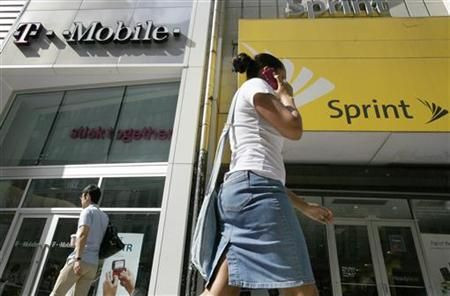Sprint/T-Mobile Deal May Fare Better with Regulators: Analyst

AT&T Inc, the second-largest wireless carrier in the U.S., faces an uphill battle as the Department of Justice's action and upcoming Federal Communications Commission action suggest a philosophy of too much wireless M&A too soon.
Following the uncertainty over the regulatory approvals for the AT&T/T-Mobile deal, focus has now shifted to what are the next available options for T-Mobile if the $39 billion deal fails to gain approval.
One of the options would be the merger of T-Mobile with Sprint Nextel Corp (NYSE:S), the country's third-largest wireless carrier and a vocal industry opponent to the AT&T/T-Mobile deal.
Analysts see the possibilities are high for a Sprint/T-Mobile combination as there would be lesser regulatory risks compared to the deal between AT&T and T-Mobile, a unit of Germany's Deutsche Telecom.
Our regulatory checks suggest lower regulatory risks associated with a potential Sprint/T-Mobile combination as we believe the regulatory agencies are likely to consider the merits of such a merger on a different basis to AT&T/T-Mobile, FBR Capital Markets analyst David Dixon wrote in a note to clients.
Specifically, we see indications that the regulators are more likely to balance their concerns regarding a lessening of competition against the likely competitive position that could develop over time if a Sprint/T Mobile merger was not approved, Dixon added.
Many investors believe the DoJ's complaint contains an implicit mandate for four nationwide wireless players.
However, the analyst's checks indicate regulatory support for three healthy nationwide players and indicate that a potential merger between Sprint and T-Mobile is more likely to be approved.
We believe a Sprint/T-Mobile combination is unlikely to substantially lessen competition in the relevant markets, particularly the business segment, which was evaluated on a nationwide basis in the current merger proceeding as T-Mobile is primarily a consumer based provider, Dixon wrote.
The analyst said regulators may evaluate the potential Sprint/T-Mobile deal on a different basis compared to AT&T and T-Mobile. Specifically, Dixon believes there would be a greater focus on the changing nature of the wireless telecommunications industry and the increasing need for wireless network operators to have sufficient scale to be able to continue to make significant investments in their network capabilities to support wireless broadband services.
The FCC noted that both Sprint and T-Mobile own substantially less local wireline assets and wireless backhaul assets relative to AT&T and Verizon (NYSE:VZ).
Meanwhile, T-Mobile cited challenging return on investment trends in reaching its decision to merge with AT&T and effectively exit the U.S. wireless market.
We believe the regulators are likely to consider this evidence to show that absent a merger, Sprint and/or T-Mobile are unlikely to independently sustain the significant investment in their wireless networks (particularly in the area of network backhaul) required to provide competitive high speed wireless data services going forward, Dixon said.
In addition, investors are expressing increased concern regarding Sprint and T-Mobile's ability to increase margins while maintaining vigorous price competition.
A key consideration in the regulatory analysis of a potential merger between Sprint and T-Mobile will be whether increased concentration in the wireless sector would result in reduced pricing pressure.
We believe that the regulator would evaluate evidence which we believe would indicate that, individually, without such a merger, Sprint and T-Mobile could not sustain vigorous price competition in the longer term, the analyst said.
Accordingly, Dixon said the regulator would conclude that such a merger would not result in a substantial lessening of competition in the wireless market.
If the deal collapses, T-Mobile would get aggregate break-up fee of about $6 billion that should strengthen its standalone position and should lead them to pursue other partnership opportunities in the near term, ahead of a merger with Sprint in the medium term.
© Copyright IBTimes 2024. All rights reserved.





















